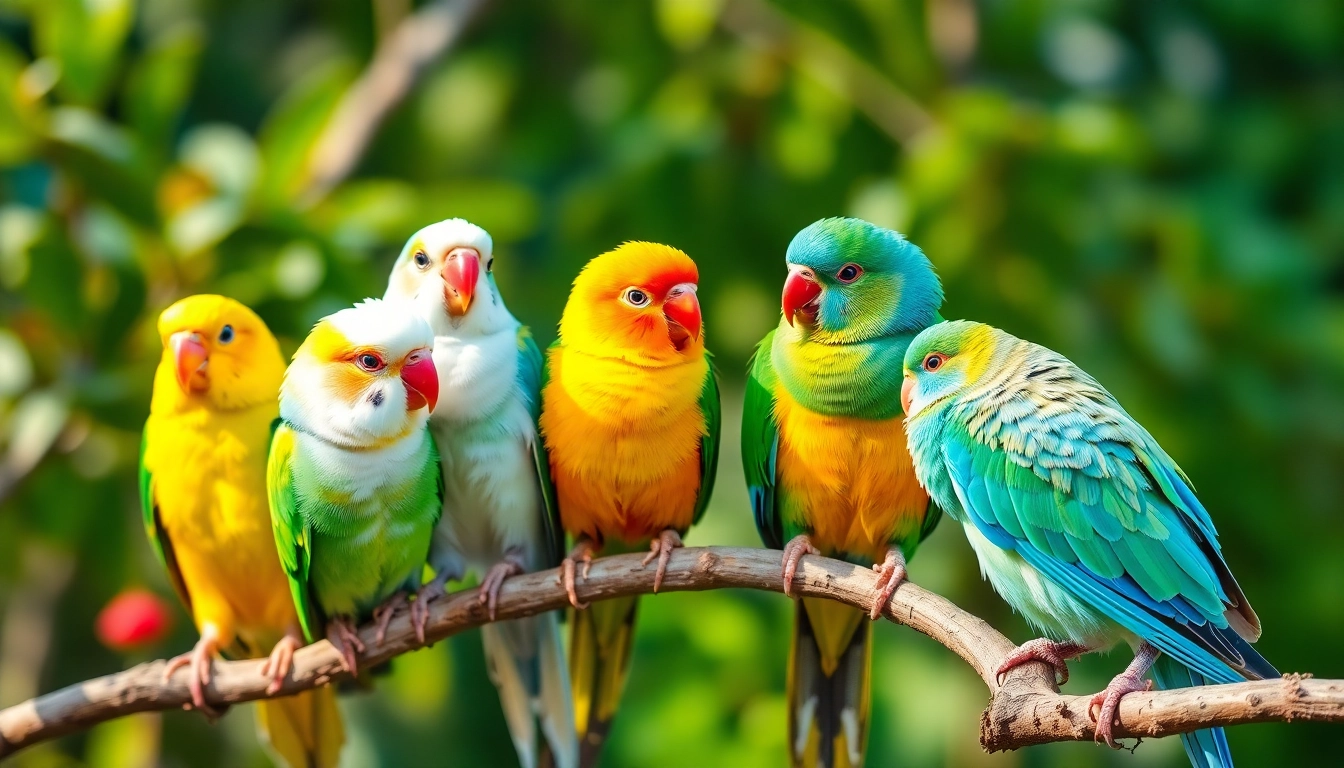Comprehensive Guide to Pet Birds: Types, Care Tips, and Choosing the Right Companion
Introduction to Pet Birds: Why They Make Great Companions
For centuries, humans have shared their lives with birds, appreciating not only their vibrant colors and melodious songs but also the companionship they offer. Today, pet birds are among the most beloved avian companions worldwide, appreciated for their intelligence, social nature, and unique personalities. Whether you’re seeking a lively addition to your home or a gentle friend to keep you company, pet birds can enrich your life in myriad ways.
If you’re considering adding a feathered friend to your household, it’s essential to understand what makes pet birds a rewarding yet responsible choice. From their benefits to choosing the right species, this comprehensive guide aims to illuminate your path towards becoming a confident, knowledgeable bird owner.
For more insights on bird-related content, explore pet birds and find expert advice and community support.
Benefits of Keeping Pet Birds
Emotional and Social Benefits
Pet birds excel as companions, offering unconditional affection and entertainment. Many bird owners report feelings of reduced stress, anxiety, and loneliness through interactions with their avian friends. Birds are highly social animals; they respond well to human interaction, which can foster a deep bond and sense of responsibility.
Their playful behaviors, coupled with their ability to mimic sounds and speech, make them engaging companions. These interactions can improve mental well-being and even encourage routines that promote discipline and caring habits.
Educational and Cognitive Advantages
Having a pet bird can serve as a delightful educational experience, especially for children. Learning about bird species, their behaviors, and care requirements fosters empathy and curiosity. Additionally, managing a bird’s diet, habitat, and health sharpens organizational and problem-solving skills.
Birds such as parrots and cockatoos are particularly renowned for their intelligence and ability to learn tricks or mimic speech, stimulating cognitive development in owners of all ages.
Low Maintenance, Long-term Companionship
Compared to many other pets, birds require relatively low-maintenance care, especially smaller species. Regular feeding, cleaning, social interaction, and health checks suffice to keep them happy and healthy. Moreover, many pet birds have impressive lifespans—some parrots can live over 50 years—giving owners the opportunity for lifelong companionship.
Popular Bird Species for Beginners
Parakeets (Budgerigars)
Parakeets, commonly known as budgerigars or budgies, are often hailed as the ideal beginner bird. They are small, colorful, easy to care for, and highly social. Their lifespan of around 6-10 years makes them manageable for new owners. Their intelligence allows them to learn simple tricks and even mimic words, making interactions lively and rewarding.
Finches
Finches are another excellent choice for newcomers due to their hardy nature and vibrant plumage. They require minimal interaction, preferring community living and space for flying within their cages. Their low-maintenance care includes regular feeding and cleanings, with less need for social interaction than parrots or cockatiels.
Lovebirds
Lovebirds are small parrots known for their affectionate nature. They thrive on social bonding and can develop strong bonds with their owners if properly socialized. They are slightly more demanding than finches or budgies but remain manageable with proper care routines.
Understanding Bird Behavior and Needs
Socialization and Enrichment
Birds are inherently intelligent and social animals requiring mental stimulation and companionship. Providing toys, foraging opportunities, and interactive playtime prevents boredom and behavioral issues. Social interaction is vital; some species thrive on daily engagement, while others can entertain themselves when left alone.
Observing natural behaviors—such as bathing, chewing, and vocalizing—helps owners tailor enrichment activities appropriately.
Diet and Nutritional Requirements
Proper diet forms the cornerstone of a healthy bird. Most pet birds thrive on a balanced mix of high-quality pellets, fresh fruits, vegetables, and occasional seeds or nuts. It’s crucial to understand specific species’ dietary needs to prevent nutritional deficiencies. For example, parrots need a varied diet rich in omega fatty acids, calcium, and vitamins.
Providing fresh water daily and avoiding toxic foods like avocado, chocolate, and caffeine are essential practices for safety and longevity.
Habitat and Housing
A suitable cage is fundamental for your bird’s health and happiness. It should be spacious enough for movement, equipped with perches of varying diameters, and lined with safe toys. Placement of the cage in a well-lit, draft-free area with consistent temperature promotes a stable environment.
Regular cleaning of the cage reduces health risks, and allowing supervised outside-the-cage time can improve physical activity and mental health.
Top Types of Pet Birds and Their Care Requirements
Small and Easy-to-Handle Birds: Parakeets and Finches
Parakeets and finches are popular choices because of their size and ease of care. Parakeets require daily interaction, toys to explore, and a diet supplemented with fresh greens and fruits. Finches prefer social groups and need ample space for flying inside their cages. Both species are resilient and adapt well to household environments.
Effective care involves regular cage cleaning, providing fresh water, and monitoring for signs of illness like lethargy or feather plucking. Their longevity makes long-term planning essential, especially for parakeets that can live over a decade with proper care.
Medium-Sized Birds: Cockatiels and Lovebirds
Cockatiels are known for their gentle demeanor, ease of handling, and ability to mimic sounds. They require social interaction for at least an hour daily, as well as a varied diet including millet, seeds, and fresh produce.
Lovebirds are intensely affectionate but can become territorial if not socialized early. Their cage should include multiple perches, toys, and opportunities for flight. Regular health checks and behavioral observations are vital to prevent common issues such as overgrown beaks or feather problems.
Large Birds and Parrots: Macaws and Cockatoos
Larger parrots like macaws and cockatoos are intelligent, highly social, and often require extensive mental engagement. They can live for 50+ years, making them a lifetime commitment. Their care involves providing large, sturdy cages, daily socialization, custom diets, and enriching environments that stimulate their natural behaviors.
These birds can be noisy and require training to prevent behavioral problems. Owners must be prepared for high maintenance and the dedicated time necessary for their well-being.
Choosing the Right Pet Bird for Your Lifestyle
Assessing Space, Time, and Commitment
Selecting a pet bird begins with honest evaluation of your living space, daily schedule, and capacity for ongoing care. Smaller birds like finches and budgerigars fit well into apartment environments with limited space and can thrive on less daily attention. Conversely, larger parrots need expansive cages, dedicated play areas, and time for social interaction.
Balancing your commitments with the needs of the bird ensures a harmonious relationship and long-term happiness for both parties.
Budget-Friendly Pet Bird Options
Cost considerations extend beyond the initial purchase price. Budget-friendly options include finches and budgerigars, which generally require less expensive enclosure setups and food. Regular veterinary care, toys, and nutritious food contribute to ongoing expenses—budget planning is essential.
Also, buying a bird from reputable breeders or rescue centers can be more economical and ethical than purchasing from unverified sources.
Best Birds for Kids and First-Time Owners
For children and first-time bird owners, selecting a calm, manageable species like cockatiels or lovebirds is advisable. These birds are tolerant, responsive, and less likely to exhibit aggressive behavior if socialized properly. Temperament, ease of care, and lifespan should guide your choice.
Educating children on responsible pet ownership ensures safety and nurtures empathy for living creatures.
Essential Care Tips for Pet Birds
Diet, Nutrition, and Feeding
A balanced diet is critical for your bird’s health. High-quality pellet mixes formulated for specific species provide essential nutrients. Supplemented with fresh fruits, vegetables, and occasional seeds, their diet supports vibrant plumage, strong beaks, and overall vitality.
Consistent feeding schedules, avoiding toxic foods, and providing clean, fresh water are foundational practices. Consulting an avian veterinarian for diet plans tailored to your bird’s species ensures optimal health.
Housing, Enrichment, and Socialization
An appropriate environment enhances behavioral health. Spacious cages with multiple perches, toys, and foraging items prevent boredom. Regular flight time outside the cage fosters physical activity and mental stimulation.
Socialization involves daily interaction—talking, gentle handling, and positive reinforcement. For shy or independent species, patience and gradual exposure yield best results.
Preventative Health and Regular Check-Ups
Routine veterinary visits prevent or catch early signs of illness. Observing changes in behavior, appetite, or droppings enables prompt intervention. Maintaining clean cages and providing adequate diet minimizes the risk of disease.
Vaccinations, parasite control, and grooming (like nail trimming and beak care) complete a proactive health management plan.
Common Challenges and How to Address Them
Dealing with Bird Stress and Behavioral Issues
Stress in pet birds can manifest as feather plucking, aggression, or vocalization. Causes include sudden environmental changes, lack of socialization, or inappropriate diet. Addressing stress involves maintaining a consistent routine, providing hiding spots, and offering enriching activities.
Patience and positive reinforcement foster trust, while consulting avian behavior specialists can provide tailored strategies.
Preventing Illness and Ensuring Longevity
Regular health monitoring, proper cage hygiene, and a balanced diet extend your bird’s lifespan. Be alert to early signs of illness, such as lethargy, changes in droppings, or loss of appetite. Immediate veterinary care prevents complications.
Environmental stressors—drafts, toxins, or unsuitable temperatures—should be avoided for your bird’s well-being.
Resources and Support for Bird Owners
Successful bird ownership benefits from ongoing education and community support. Reputable avian veterinarians, bird clubs, and online forums provide valuable guidance. Rescue organizations also offer resources for adopting and caring for birds with specific needs.
Professional training and continuous learning support responsible and fulfilling pet ownership.

